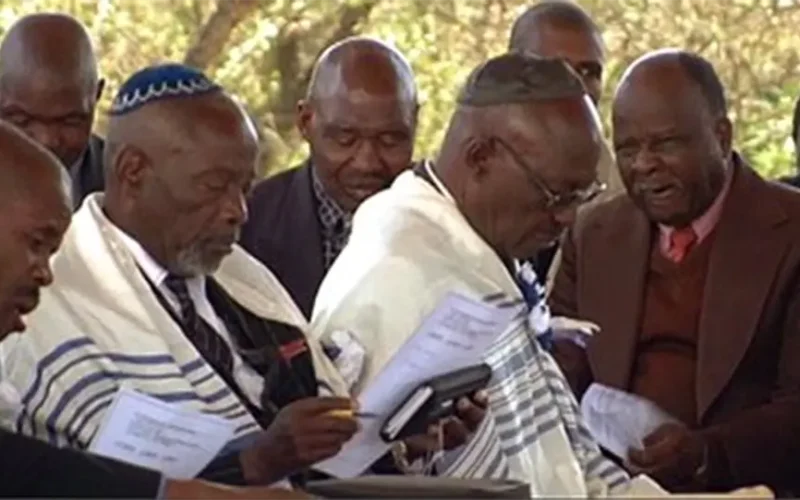A man wearing a yarmulke stands on the edge of a hill, quietly taking in the landscape below as he considers his ancestors and their histories in this place. This isn’t Israel. It is Mapungubwe Hill, a Unesco World Heritage Site in the north of South Africa’s Limpopo province.
The man in the yarmulke is one of around 100,000 Lemba people, Black Jews who live in South Africa and Zimbabwe.
Lemba people have long held that they are Jews by descent. In the 1990s and early 2000s, scientists set out to determine whether this could be genetically substantiated. Those studies found evidence of Y-chromosome Lemba links to other Jews.
Lemba leaders then defied the expectations of those who assumed they would attempt to use the results to appeal to the Israeli state for recognition and emigration.
After all, Israel represents itself as the homeland of all Jews.
Lemba people did not orient themselves towards Israel. Instead, they interpreted their genetic studies as proof that Jews were African and that Lemba people were, therefore, indigenous African Jews.
I am an anthropologist and have studied Lemba people’s genetic knowledge production since 2004. Over the years, I have learned from them to understand that indigeneity – an often protected status designating pre-colonial peoples in countries with colonial histories – and genetic ancestry are both powerful ways to seek rights and belonging.
Indigeneity is a political concept and a group identity that emerged in the 1970s as a means to illustrate the relationship between colonisers and the people whose land they occupied. Indigenous peoples are recognised throughout the world as those with original and ongoing links to specific places. Lemba leaders, too, emphasise land as part of their identity. But their view is that one can be indigenous to more than one place and that more than one people can be indigenous to a single place.
This understanding stands in stark contrast to the idea that Jews originate from Israel and therefore have the only valid claim there.
Two lessons
There are two lessons I take from Lemba leaders’ understandings of Jewish indigeneity.
The first is to decentre Israel as the primary Jewish ancestral place. This might mean centring Africa instead, as Lemba people do. The Lemba people I learned from believe that all Jews are originally African.
As Talmudic scholar and historian of religion, Daniel Boyarin has argued, there is no single homeland that Jews came from, nor is there a single one that can offer a viable Jewish future. For Boyarin, securing a Jewish future comes from making Jewish meaning through study and practices in the diaspora, not through state power based on ethnic identity.
This is contrary to the Zionist view that Israel is the ancestral home of all Jews. Zionism emerged as a movement among European Jews in the late 19th century and was the driving force behind the creation of the state of Israel. This resulted in the violent displacement of Palestinians living on the land and was therefore in essence a settler colonial project.
This colonial relation reverberates today in the destruction of Gaza and its people, and in the illegal settlements in Palestinian territories that Israeli settlers have continued to advance with state support.
The second lesson is to take seriously that, for the Lemba people, being indigenous in South Africa is grounded in colonial history. In their eyes, being indigenous means having a history of being subjected to colonial dispossession. So while Lemba people understand many people different from themselves as also indigenous to South Africa, they stop short of including white descendants of colonial settlers.
It follows from this, therefore, that it’s impossible to locate Jewish indigeneity in a Zionist project.
Genetic studies
Genetic definitions of peoplehood naturalise colonial ideas about race. And that can have dire consequences.
Lemba genetics has not reshaped Jewish genetics, because the starting point for Jewish genetic ancestry research remains an unquestioned definition of who is a Jew. Studies that have aimed to characterise large-scale Jewish genetic diversity and to map Jewish origins haven’t included Lemba DNA among their Jewish comparative samples.
I point this out because genetic ancestry research is not only shaped by the questions researchers pose and the statistical methodologies they use to test ideas. It is also shaped by how groups of people are defined and named.
This matters because Zionist framings of all Jews as indigenous in Israel sometimes misleadingly draw on Jewish genetic studies to support their claims. This, alongside locating Jewishness in biology, racialises Jews.
Defining Jews as a race has already led to one genocide in Nazi Germany. My fear is that current appeals to Jewish indigeneity are now being mobilised in service of another in Gaza.
It does not have to be this way. Lemba people show us that there are anti-colonial Jewish alternatives to Zionism. They show us that Jews belong wherever they are, not at the expense of others, but alongside and in solidarity with them.
NOAH TAMARKIN, Research Associate, Wits Institute for Social and Economic Research, University of the Witwatersrand and Associate Professor of Anthropology and Science & Technology Studies, Cornell University
- This article is republished from The Conversation under a Creative Commons license. Read the original article.














